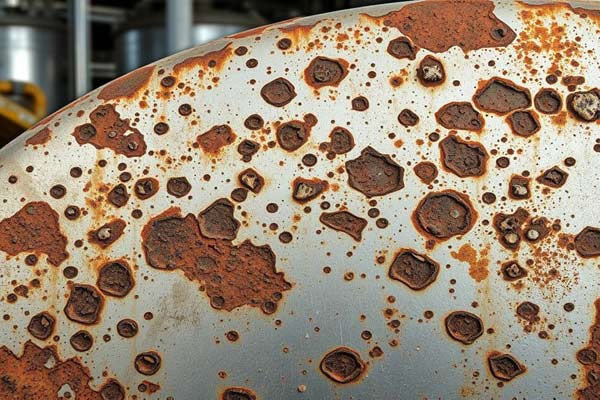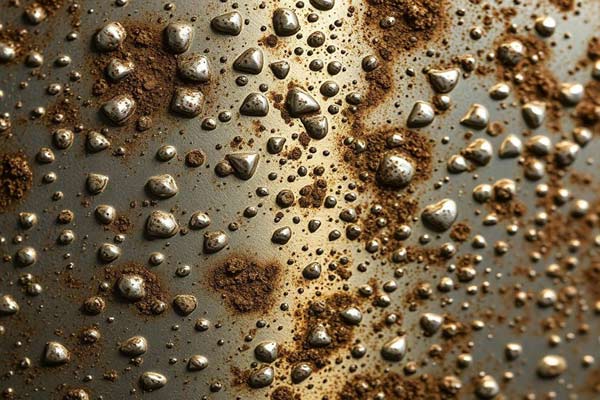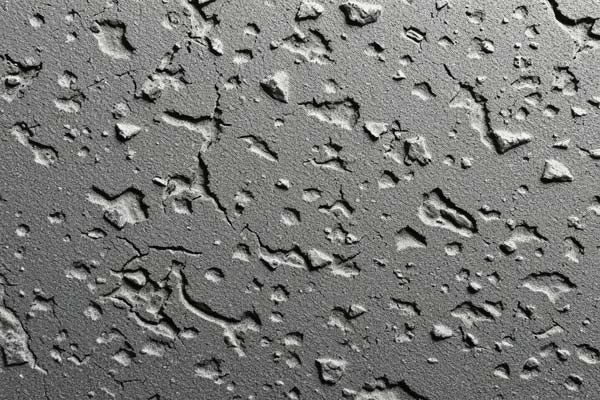A detailed close-up of a VT1000 pitting photo examples, showcasing intricate textures and varying depths of pitting, with a focus on the interplay of light and shadow highlighting the imperfections, set against a neutral background to enhance clarity and detail.
Pitting corrosion is sneaky and can damage even the best systems. It’s a big problem that needs our focus. That’s why I’m sharing this detailed guide on dekra vt1000 pitting and vt1000 pitting photo examples. We’ll look at why pitting inspections are key and how the DEKRA VT1000 helps in analyzing pitting. You’ll get the tools and knowledge to face this challenge.
Table of Contents
What is Vt1000 Pitting Photo?
VT1000 pitting is a form of corrosion that damages industrial equipment and structures. It’s a big problem because it can cause serious harm if not fixed. Knowing what VT1000 pitting is and how it works is key to keeping systems safe and sound.
VT1000 pitting happens when small, localized areas of metal loss or “pits” form on a material’s surface. This usually happens when the protective coating or passive film breaks down. It often affects stainless steel and other metal alloys in important places like pipelines, tanks, and processing equipment.

The VT1000 pitting definition is simple:
- It’s a type of localized corrosion that creates small, deep pits on metal surfaces.
- It’s caused by a breakdown in the protective film or coating, exposing the metal to corrosive environments.
- It’s common in many industries, including oil and gas, chemical processing, and water treatment.
- If not caught and fixed, it can lead to structural problems, leaks, and even failures.
Knowing the signs and causes of VT1000 pitting is vital. It helps us find and fix problems before they get worse. This keeps industrial equipment and structures running safely and reliably.
| Characteristic | Description |
|---|---|
| Appearance | Small, circular or irregularly shaped pits on the metal surface |
| Depth | The pits can range from shallow to deep, depending on the severity of the corrosion |
| Location | Pits can form randomly across the metal surface or in specific areas exposed to more corrosive conditions |
| Causes | Breakdown of protective coatings, impurities in the metal, and exposure to aggressive environments |
Vt1000 Pitting Photo Examples
Checking for pitting corrosion in industrial items is very important. The DEKRA VT1000 shows clear pictures to help see how bad the pitting is. Looking at these photos can help you spot and fix problems in your equipment and buildings.
Mild Pitting Examples
Mild VT1000 pitting has small, shallow marks on the surface. These marks are not too many and don’t hurt the structure much. Spotting and fixing mild pitting early can stop it from getting worse.
Severe Pitting Examples
Severe VT1000 pitting has deep, focused pits that can really weaken the material. These big pitting problems need quick action and might mean you have to replace or fix the part to keep your equipment safe and working right.
| Pitting Severity | Characteristics | Risks and Implications |
|---|---|---|
| Mild Pitting | Small, shallow indentations spread out on the surface | May lead to more severe pitting if left unaddressed |
| Severe Pitting | Deeper, more concentrated pits that significantly weaken the material | Increased risk of component failure and potential safety issues |
Knowing what mild and severe VT1000 pitting looks like helps you make better choices about fixing or replacing your important industrial items. Using the DEKRA VT1000’s detailed pitting photos is a great way to improve your pitting checking and analysis skills.
Features of Vt1000 Pitting
Understanding VT1000 pitting is key for effective checks and analysis. We’ll look at its physical traits and common causes. This helps in spotting and fixing corrosion issues.
Physical Characteristics
VT1000 pitting has unique physical traits. It’s known for small, circular pits on metal surfaces. These pits can be tiny or several millimeters wide.
The pits’ depth varies too. Some are shallow, while others go deep into the material. A crystalline or dendritic pattern inside the pits is another key feature. This pattern shows how the corrosion started.
Causes and Contributing Factors
Several factors lead to VT1000 pitting. These include:
- Electrochemical Imbalances: Differences in electrochemical potential on the metal surface cause pitting.
- Microstructural Defects: Impurities or irregularities in the metal start pitting.
- Environmental Conditions: Certain environments, like chlorides or acidic solutions, speed up pitting.
- Mechanical Stresses: Stresses on the metal surface also contribute to pitting.
Knowing these traits and causes helps in identifying and fixing VT1000 pitting. This ensures the safety and reliability of important parts and systems.
Read More – Underwater Welder Salary
Applications of The Vt1000 Pitting
The DEKRA VT1000 pitting inspection system is used in many industries. It helps find and study pitting problems. Let’s look at some main uses of the VT1000 pitting technology.
Oil and gas industry
In the oil and gas industry, pitting is a big issue. It can happen in pipelines and storage tanks. The VT1000 checks these areas well. This way, operators can fix problems early and keep their equipment safe and reliable.
Manufacturing and automotive industries
The VT1000 is also key in the manufacturing and automotive industries. It checks the condition of machines and parts. This ensures they are good quality and don’t break down. It helps in making smart choices about when to fix or replace things.
Generation industry
The VT1000 looks at turbines and generators. Pitting can harm these important parts. The VT1000 finds pitting early, helping avoid big problems or shutdowns.
Maritime industry
The VT1000 checks ships and platforms. Pitting is a big worry here. The VT1000 does thorough checks. This helps keep these vital assets safe and working well.
The DEKRA VT1000 pitting inspection system is very useful in many fields. It gives clear, detailed info on pitting. This helps companies make better choices, improve how things work, and keep everything safe and reliable.
What is Dekra VT1000 Pitting Photo?
It’s important to understand the role of pitting inspections in keeping industrial assets safe and reliable. Pitting corrosion can cause serious problems if not caught early. This is where the DEKRA VT1000 comes in, helping to spot and assess pitting issues.

Understanding the Importance of Pitting Inspections
Pitting inspections are key to catching vt1000 pitting problems before they get worse. By finding and tracking pitting corrosion, operators can prevent risks and keep equipment running longer. Regular pitting inspections help find and fix issues early, making things safer and saving money on repairs.
The Role of DEKRA VT1000 in Pitting Analysis
The DEKRA VT1000 is a tool made to find and study pitting corrosion. It uses advanced tech to take clear dekra vt1000 pitting images. Experts then look at these images to see how bad the pitting is. This helps professionals decide the best way to take care of their equipment, keeping it reliable and working well for a long time.
| Key Advantages of DEKRA VT1000 in Pitting Inspections | Description |
|---|---|
| Accurate Pitting Measurement | The DEKRA VT1000 gives exact measurements of pitting depth, size, and spread. This helps in detailed analysis and making smart choices. |
| Comprehensive Pitting Evaluation | The tool makes high-quality images and data. This lets for a full check of the pitting condition, helping in planning maintenance. |
| Enhanced Safety and Reliability | By spotting and fixing pitting problems early, the DEKRA VT1000 stops expensive breakdowns. It keeps industrial assets running safely. |
Why we need of Dekra Vt1000 Pitting?
Pitting is a common problem in many industries. It can be dangerous and cause expensive equipment failures if not fixed. The DEKRA VT1000 is a key solution for why dekra vt1000 pitting and highlights the importance of dekra vt1000 pitting checks.
Let’s explore pitting corrosion together. We’ll learn about the DEKRA VT1000, a tool that changes how we fight this issue. We’ll understand the physical signs and causes of pitting. This will give you the knowledge to make a real difference in your field.
Ensuring Safety and Reliability
The DEKRA VT1000 is crucial for keeping equipment safe and reliable. It does this by analyzing pitting and spotting weaknesses and defects early. This way, it prevents big failures and keeps machines running safely, protecting people and property.
Preventing Costly Breakdowns
Equipment failures due to pitting can be very expensive. They can also cause a lot of downtime and lost work. The DEKRA VT1000 helps avoid these problems by finding and fixing pitting issues early. This saves money and keeps equipment running longer.
| Benefit | Description |
|---|---|
| Enhanced Safety | The DEKRA VT1000 finds safety risks from pitting, letting us fix them before accidents happen. |
| Improved Reliability | It spots and fixes pitting early, making sure important equipment works well. |
| Cost Savings | Its preventive maintenance stops expensive breakdowns and saves on downtime. |
The DEKRA VT1000 is essential for industries that need reliable equipment. It ensures safety and reliability and prevents costly breakdowns. This makes it a key part of keeping businesses running smoothly in many fields.
Read More – Myfastbroker Stock Broker
The Impact of Pitting Images Across Various Industries
Pitting images have a big impact in many industries, like oil and gas, manufacturing, and automotive. They help manage assets and reduce risks. These images are key for keeping things running smoothly.

Oil and Gas Industry
In the oil and gas world, pitting images are super important. They help spot problems in things like pipelines and tanks. By looking at these images, experts can catch issues early and fix them before they get worse.
This means less downtime and more safety. It also helps keep important equipment working longer. Pitting images in oil and gas make things safer and more efficient.
Manufacturing and Automotive
The impact of pitting images is huge in manufacturing and cars too. In factories, they check how machines are doing. This helps them run better and avoid unexpected stops.
In cars, pitting images in manufacturing and automotive check the health of parts like engines and brakes. This helps make better choices and prevent problems. It’s all about keeping things running well.
Using pitting image analysis helps companies in these fields. It makes their operations better, safer, and more reliable. This is good for everyone involved.
Benefits Of Using The DEKRA VT1000 Pitting Images
- The DEKRA VT1000 is a top-notch tool for capturing and analyzing pitting images. It brings unmatched accuracy, efficiency, and insights. This makes it a must-have for industries where pitting is a big deal.
- This device is great at improving the accuracy of pitting inspections. Its advanced imaging and algorithms spot every pitting defect with high precision. This means you get reliable data for better decisions and maintenance plans.
- Another big plus is how it helps reduce downtime. It quickly finds pitting problems, so you can fix them before they get worse. This saves time and money and makes your assets more reliable.
- The DEKRA VT1000 also boosts asset integrity in many industries. It offers detailed pitting analysis and reports. These insights help plan preventive maintenance, extend asset life, and manage risks. This way, you can keep your assets running well, last longer, and stay safe.
| Feature | Benefit |
|---|---|
| Improved Inspection Accuracy | Reduced risk of missed or misidentified pitting defects, leading to more reliable data and better-informed decision-making. |
| Reduced Downtime | Early detection and proactive maintenance help minimize costly and time-consuming repairs, improving asset availability. |
| Enhanced Asset Integrity | Detailed pitting analysis and comprehensive reporting enable optimized asset performance, extended lifespan, and improved safety and reliability. |
In short, the DEKRA VT1000 is a game-changer for managing pitting issues and keeping assets in top shape. It boosts your inspection accuracy, cuts downtime, and improves asset performance. This leads to better overall efficiency and success.
Conclusion
We explored VT1000 pitting in depth. We looked at many photo examples to show how it can vary. The DEKRA VT1000 is a key tool for experts to tackle pitting issues.
This tool helps ensure the safety and reliability of important assets. It’s used in many fields, like oil and gas, and manufacturing. This shows how vital it is for protecting critical infrastructure and avoiding expensive failures.
Using the DEKRA VT1000 for pitting checks is key to better asset performance. It helps reduce risks and improve operations. By following the advice in this guide, professionals can handle VT1000 pitting well. This helps their organizations succeed in the long run.
Frequently asked questions
Q.1 What is VT1000 pitting?
Ans. VT1000 pitting is a type of corrosion that forms small, deep pits on metal surfaces. It can cause significant damage and weaken equipment.
Q.2 Why are pitting inspections important?
Ans. Inspecting for pitting is key to keeping equipment safe and running smoothly. It prevents sudden failures that can be dangerous and costly.
Q.3 How does the DEKRA VT1000 help in pitting analysis?
Ans. The DEKRA VT1000 accurately measures pitting corrosion. It helps assess the damage, guiding maintenance and repairs to keep equipment safe.
Q.4 What are the physical characteristics of VT1000 pitting?
Ans. VT1000 pitting creates small, localized pits on metal surfaces. These pits vary in size and pattern, depending on the cause and environment.
Q.5 What are the common causes of VT1000 pitting?
Ans. Several factors can cause VT1000 pitting, like chemical attack and microbiological corrosion. Knowing the cause helps in finding solutions.
Q.6 Where can VT1000 pitting be observed?
Ans. VT1000 pitting is found in many industries, including oil and gas and manufacturing. It’s crucial to address it to ensure safety and reliability.
Follow – https://viraldigimedia.com for More Updates